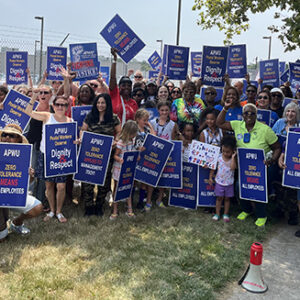February 26, 2013
Union, Management Reach Agreement On Locally Acquired Equipment Policy
In response to demands by the APWU — and approximately a year of negotiations — the Postal Service issued new guidelines on Jan. 29, 2013, governing the procurement of postal equipment by managers at the local level.
The APWU pursued the issue at the National Joint Labor Management Safety and Health Committee after safety concerns arose following the purchase of equipment by a local manager in Seattle. After the manager had a “tabbing system” installed, workers discovered that the equipment could not be “locked out;” a preventive maintenance schedule had not been established; the equipment had not been subject to a safety inspection prior to acceptance, and employees had not been trained to properly use the equipment. (The tabbing system processes mixed mail that is not “automation ready” and turns it into a configuration that can be run through automated equipment.)
The APWU requested that management establish guidelines on the purchase of equipment because procurement by local managers is widespread. Management initially resisted the union’s request, claiming the matter was a local issue, but eventually agreed.
The new Locally Acquired Equipment Policy states that, at a minimum, the local authority approving the acquisition of postal equipment is responsible for the installation of equipment and for developing a Job Safety Analysis. The local authority is also responsible for obtaining technical information, use instructions, and maintenance instructions from the manufacturer or supplier, as well as for ensuring appropriate staffing, the availability of spare parts, and the availability of appropriate tools.
The Employee and Labor Relations Manual (ELM) also states that installation heads, purchasing, contracting officers, and other managers are responsible for ensuring that all suppliers and contractors working on Postal Service property follow safety regulations established by the Occupational Safety and Health Administration (OSHA), as well as Postal Service safety and health policies. All suppliers must conform to OSHA regulations, and a Postal Service representative must be assigned to monitor supplier activities as appropriate.
The APWU believes the new procurement policy will result in improved safety conditions on the work floor.



